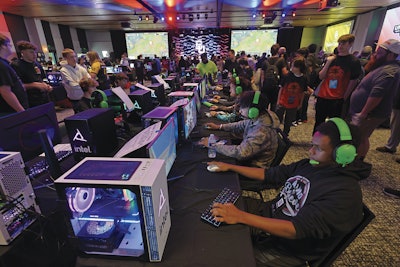
In the Oso Esports Lounge, high-level student-athletes are putting their skills to the test, but it doesn’t look like a ballfield or weight room where one may expect to find a majority of college athletes. Instead, there are screens, comfortable chairs and cries of victory in the air.
“Research shows us that 88% of students are gaming on some level,” says Adam Stanley, Baylor University’s first esports director. “We also see this as a connection to engineering and computer science. The data tells us that about 38% of students interested in competitive gaming — esports — have an interest in engineering and computer science. That is a tremendous program on our campus that we want to bolster and find pathways for recruitment.”
Stanley himself was a highly ranked professional gamer 20 years ago, traveling to tournaments and creating a framework for the world of competitive video games. The students he coaches now aren’t playing the old-school games Stanley cut his teeth on. Instead, game titles such as Rocket League, Smash Brothers, NBA 2k and Madden are among some of the most popular games played at the collegiate level.
“We have practice every day. We have routines and schedules that are drawn out weekly based on their class schedules and other responsibilities. We have study tables and GPA requirements,” Stanley says. “A lot of people are surprised to learn that we do workouts, lift weights and do cardio. I’m a firm believer that a healthy body is a healthy competitor, so that is no different for us.”
While Stanley’s esports athletes keep practice schedules and hit the gym similar to traditional student-athletes, he acknowledges that there are some differences between esports and traditional athletics. “It’s cheaper than traditional sports. This is a realm of things that, comparatively, is very inexpensive,” he says. “There’s very little travel involved. It’s mostly digital, so for that reason, it’s worth exploration by administrators.”
On top of the affordability of esports, Stanley also notes the value of training up and educating the whole person. “The value in practicing the virtues of fortitude, temperance and perseverance,” he says. “It just so happens that those same things happen in the competitive esports space, as well.”
Stanley hopes that his students are learning how to be leaders, how to communicate and how to problem solve in real time. He adds that through esports, students learn how to win well and how to lose well.
On the horizon for Baylor’s esports team is an exploration of how to encourage more women to join the sport at the collegiate level. “We know that females are gaming. They’re out there and almost at an equal level with males,” Stanley says. “Unfortunately, what is happening at the top level is that females are not being invited into that space. We don’t know why. There is a space and an open invitation, but we’re not seeing the same numbers.”
Despite the current gender disparity, Stanley is convinced that collegiate esports is destined for growth. He has already seen it within the K12 space, as Baylor recently hosted the TexSEF 2025 Undisputed State Championships.
“Fourteen hundred high school students came to Waco and were in our facility competing,” Stanley says. “There were amazing stories of triumph, loss and teamwork. Some really beautiful things.”
As a part of bringing Stanley into the Baylor athletics family, the university is positioning itself to be a part of the larger esports community. Stanley says he hopes that the program can help share its story with students and encourage more to come to the BU campus to study and compete.
Says Stanley, “If you’re a gamer, there’s a spot for you.”





































